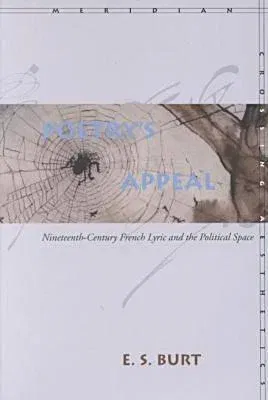Socrates banished poetry from the ideal republic, adopting the
philosophical position that poetic language operates outside the
conventions of public discourse and is private in expression. But what
does the banished language of poetry say about its relation to public
space? Is it possible to draw a line severing the language of beauty
from the language of truth? Derrida asks whether the line ought rather
to pass between Western metaphysics, with its logic of polar opposites,
and another way that does not organize everything in oppositional terms.
The verbal economy organized around the poem as inscription, for
instance, fits awkwardly with a division between a public discourse
under the aegis of truth and a private one regulated by aesthetic
pleasure.
Poetry's Appeal takes the reemergence of a viable poetry in the
politicized culture of revolutionary and post-revolutionary France as a
signal that poetry's sentence of exile from the public arena is
unresolved. It finds that poetry addresses history and the political
through a disjunction between its illusory status as a song of private,
lyrical intent and its actual state as a material inscription,
inevitably public in character.
The book confronts several issues raised by the gap between poetry's
aesthetic status and its material state. It shows that this gap allows
poetry to make a strong critique of symbols as weapons for waging
ideological warfare. As lyric, a poem naturalizes linguistic structures
whose artificiality, as inscription, it makes manifest. Inscription thus
enables the poem to act subversively against the ideology it supposedly
supports. Furthermore, the chances and economies of the letter, the
mark, and the page can have productive, positing power in poetry. The
author argues that the zones and pockets that emerge thanks to
nonsignifying elements of language have analogies for reading the city
space.
In chapters on Chénier, Hugo, Baudelaire, Mallarmé, and Valéry, the book
details some of the struggles between the ideological and material sides
of poetry with the nineteenth-century remappings of political space:
memory and the archive, the censorship of material history, the propping
of founding performatives, the legibility of founding texts, the need to
redefine action where technique is productive, and the recognition and
assimilation of zones owed to technique.

